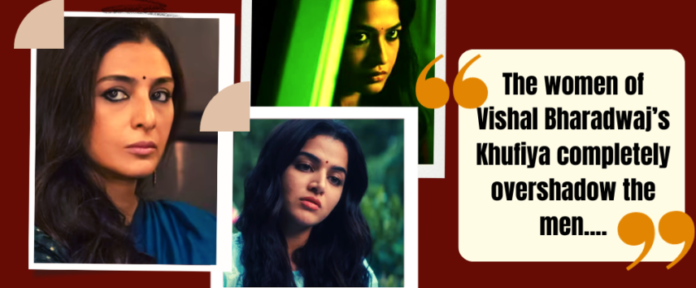Vishal Bharadwaj’s straight-to-Netflix ‘Khufiya’ explores a spy universe predominantly ruled by women players. It consciously treads away from the glitz and the flamboyance usually associated with this genre. A slow burner, this movie doesn’t have slick and taut operations or morally high-ground officials only. Things are not always organized. There are no superhumans to save the day, and missions go haywire where key personas mess up.
Overall it portrays a more realistic view of human frailty, ennui, and lucky breaks.
Khufiya is set in an interesting premise. Some extremist forces in Bangladesh were purportedly falling prey to Pakistan’s ISI’s plans to establish a terror network on India’s eastern border. A team of Indian intelligence agents under the leadership of Krishna Mehra (Tabu) attempted to crack the then-hardline Bangladeshi government with the assistance of a local agent (Bangladeshi actor Azmeri Haque Badhon). The plan is supposedly jeopardized by an Indian intelligence operative named Ravi (Ali Fazal), who is presumably working for the Americans, trying to help Pakistan win the grand game in Afghanistan.

What sets the story apart is the dilemmas shown in the thrillingly potent geopolitical espionage setup involving three or more countries. Unlike the usual good guy-bad guy face-offs here the stakes are more complex – a nuclear deal for the country or the security on the eastern coast. It is this complexity that slows down the pace and makes the scenarios more intense.
But what drives the movie is the championing of female agency in a multitude of forms, with actors competent to flesh these intriguing characters out. This espionage story is a tale of 3 women above all.
Three Women and the duality of their lives
Tabu as KM is poignant and dedicated yet torn between her duties and vulnerability. She loves her son but falters at the expression. Unapologetic about her less-than-good cooking skills or saree-wearing capability, she knows her worth and uses her job as a vessel of emotional fulfillment. Falling in love and then losing it to fate, her turmoil is one of the centerpieces of the story. Following her character arc I wished this could be a series. Then we could get to explore more about her past, her supportive ex-husband, her motherhood journey, and her failed relationships.
Then there is Badhon as Heena, the Bangladeshi actor, with a mole between her collarbones. The movie describes her in the opening scene, as mystical like a sin, and obvious like a sacred deed. Code named Octopus, she would bind you not with her 8 tentacles but her two captivating eyes. The girl knows how to love fiercely and doesn’t shy away from using her oomph to get her way or bet her life to prove her devotion.
Then there is Chaaru, played by Wamiqa Gabbi. A naïve housewife whose pain transforms her and with one revelation she is grown up without being herself. When she dances like no one is watching, free from all the shackles, the screen is alive. All through the movie she lives a dual life. Before the interval, she masks her jovialness with that of a dutiful wife. In the second half, she hides her real motive under the refuge of her wifely duties.
The women eclipse the men in this narrative
It is the vulnerability, the vengeance, and the duality of life of these three women that drives the narrative. Then there is another woman, Chaaru’s MIL who is equally interesting to watch on screen. I think her character was the most realistic one showing the reality of skewed spirituality trying to veil the ugliness of patriarchy.
However at times, one may feel the writing is so consumed by the female agency that the male characters are reduced to vignettes. It had been a story of women at work with the men sidelined mercilessly. Even great performers like Atul Kulkarni, and Ashish Vidyarthi were not used much.
Overall it has been an interesting watch with soul-driven performances. Watch it for the women in action.


5nvjpv